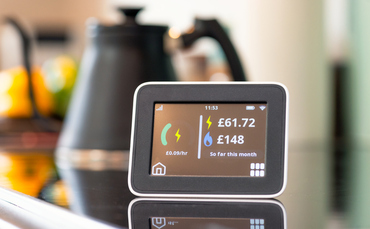The government’s national smart rollout is proceeding far too slowly, according to a new report from MPs, which warns that deployment targets are being missed and the costs associated with the programme are still rising.
Publishing the findings of its inquiry into Britain’s smart meter rollout today, Parliament’s Public Accounts Committee (PAC) said not enough was being done by the government and Smart Energy GB – the non-profit body tasked with overseeing the rollout – to boost public engagement with the devices.
During the PAC’s inquiry, it said it had heard that energy suppliers were under pressure from government-imposed smart meter targets, and are then in turn putting pressure on consumers to accept the installation of smart meters – an approach it warned risked undermining public acceptance of the technology.
The Committee also raised concerns that smart meters were being disproportionately installed in the homes of – and therefore providing benefits to – higher income households. And it warned that adoption rates were particiularly patchy in some rural and more remote areas, as well as in London.
Smart meters are widely regarded as a critical component of the transition towards a net zero power system, given their ability to enable more flexible energy tariffs and encourage households to curb energy use.
But today’s PAC report argues there remains a lack of up-to-date data on the effectiveness of the smart meters in helping to improve household energy efficiency, reduce bills, and cut emissions.
As such, it argues a rethink of the current public engagement strategy for the smart meter rollout may be needed, with more effort made to ensure devices are promoted to those on lower incomes who could benefit from more data to help them save energy at home.
Plans to install smart meters in every home and business across the country were first conceived in 2008, with a planned completion date for the national roll out of 2019. Yet four years after that target date, the goal is still little more than half way towards being met, with 34.4 million devices operating in around 57 per cent of homes as of March 2023.
Proponents of the devices argue that by enabling users to keep track of their energy use and costs in real time they can help encourage energy saving behaviours that can reduce demand for electricity on the national grid and therefore cut down on greenhouse gas emissions.
Smart meters are also regarded as crucial to supporting a national energy system increasingly dominated by clean energy technologies such as wind farms, solar power, and electric vehicles, by allowing suppliers to offer time-of-use tariffs and other flexible grid services that incentivise customers to better match demand to supply on the grid.
Recent research by influential energy consultancy Cornwall Insight estimated that flexible home energy capabilities achieved through a mix of time-of-use tariffs, solar panels, and batteries – and all enabled through smart meters – could help cut UK household electricity costs by £4.6bn a year in 2030, and by £14.1bn in 2040.
However, the national rollout has been sluggish, beset by various challenges such as a lack of public awareness, a shortage of installers, and the disruption caused by the Covid-19 pandemic.
While the government forecast in 2019 that the total cost of the rollout would be in the region of £13.5bn, it is now expected to rise as engineer shortages and inflation have pushed up average installation costs. These costs are initially borne by suppliers, but are fed through to households via energy bills, heaping further costs onto billpayers.
Moreover, components for around seven million smart meters are set to become obsolete when 2G and 3G networks are switched off, and will therefore need upgrading or replacing, thereby exposing billpayers to further costs, the PAC warned.
The Committee therefore urged the government to carry out a major review of the national smart meter strategy, in order to secure a better understanding of the state of the rollout and devices currently in operation today, and assess the success of the current public engagement approach.
Labour MP Dame Meg Hillier, chair of the Committee, said the original vision for a smart meter in every home and business by 2019 “remains a distant one”.
“There are functionality issues with many, millions will have to be replaced when they become obsolete, and the evidence is unclear whether their benefits are even working as advertised,” she said.
Hillier said the PAC’s investigation also indicated that smart meters “have serious reputational obstacles to overcome with the public”.
“In particular, our inquiry has found that consumers’ enthusiasm for adopting one has been understandably harmed by recent shocking reports of forced installations,” she said. “The government must now get onto the front foot and explain how it is going to sell this troubled programme to the public – and how it will successfully deliver during a cost-of-living crisis for those it ought to benefit the most.”
A spokesperson from Smart Energy GB described the smart meter rollout as “one of the biggest and fastest behaviour change programmes in UK history, with 33 million smart meters now in people’s homes and businesses.”
“In the first six months of 2023 alone, nearly 1.7 million new meters were installed, with independent research showing there are eight million adults who would seek or accept a smart meter in the next six months,” the spokesperson said. “This shows there is strong momentum and a continuing demand for smart meters.
“The vast majority of people are happy with their smart meter and think the rollout has been positive for Britain. Latest polling shows that 89 per cent of people are happy with their smart meter while 80 per cent think the rollout has been a positive step for the country.
But the PAC is not the first government body to highlight the sluggish pace of the smart meter rollout, with government spending watchdog the National Audit Office (NAO) over the summer also warning that a number of barriers to deployment persist, such as a shortage of installation engineers and fears of limited enthusiasm for the devices among consumers.
In response to the report, a spokesperson from the Department for Energy Security and Net Zero said: “The latest NAO report recognised progress made on the rollout of smart meters, acknowledging savings would be worth around £50 a year off a typical dual fuel bill. Suppliers have been set ambitious but realistic installation targets so as many people benefit as quickly as possible.
“Energy suppliers are also obliged to upgrade communications equipment to ensure smart meters continue to be connected, and we are working with industry to support a smooth transition for consumers when 2G and 3G is switched off at the end of 2033.”
Keep up to date with all the latest green business news by signing up to the free Daily and Weekly BusinessGreen Newsletters.










